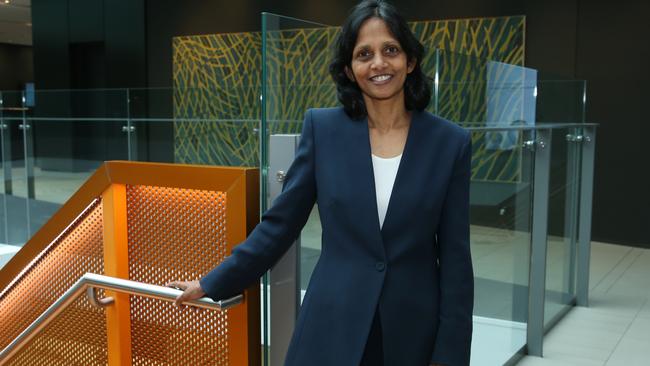Macquarie chief Shemara Wikramanayake calls for faster renewables transition
Macquarie CEO Shemara Wikramanayake says renewables are now the cheapest form of new generation in almost every part of the world.

Business
Don't miss out on the headlines from Business. Followed categories will be added to My News.
Macquarie Group’s chief Shemara Wikramanayake says governments and business must rapidly accelerate the execution of climate and energy transition strategies, including the need to “radically scale up” changes to infrastructure.
In the lead up to the United Nations global climate conference in Glasgow, which starts October 31, she highlighted five challenges confronting emission targets under the Paris Agreement.
Ms Wikramanayake said they included the pace of deploying renewable energy, which needed to ramp up from about 250 gigawatts a year to more than 1 terawatt by 2030.
“Renewables are now the cheapest form of new generation in almost every part of the world, and investor interest far outstrips project supply. So, the economics are on our side,” she told Macquarie’s Green Energy Conference held online on Tuesday.
“Where governments set clear ambitions through NDCs (nationally determined contributions) and net zero targets, backed by strong and sustained policy commitments, and investor friendly enabling environments, the private sector can direct huge pools of capital towards wind and solar, increasingly without the need for public subsidy.
“However, some important challenges do remain.”
Ms Wikramanayake said it was important that renewable project numbers were increased, bottlenecks that held up project development removed, and that governments prioritised renewables in their energy generation mix.
Domestically, the Morrison government is set to release a long-term emissions strategy in coming weeks, after Nationals leader Barnaby Joyce said he would not oppose a net-zero plan as long as regional Australia wasn’t hurt by the move.
Ms Wikramanayake used her conference speech to highlight gaps in the progress of emerging markets and developing countries on providing an “enabling environment” for private capital in the renewables sector, and committing to more ambitious emission commitments.
“It’s vital we make progress in this area at COP (Conference of the Parties Glasgow meeting),” she said.
“We already know that Glasgow will be very different to Paris. We all want to see world leaders raise the ambition on climate.”
Ms Wikramanayake mentioned that electric vehicles were on their way to cost parity with fuel-based cars, creating a “positive feedback loop” with renewables and grid energy storage. She said as well as initiatives in Macquarie's asset management unit and Green Investment Group the company was working to develop and finance smart grids to aid the integration of renewable energy.
Investing in and financing the adaptation of infrastructure to deal with more volatile weather and cleaner forms of energy was also among the challenges raised by Ms Wikramanayake.
“We sadly don’t need to look far for the tragic human and economic costs of our changing weather – all happening a decade earlier than previously feared,” she said. “While good stewardship is important, it isn’t enough. We need to see progress at COP on financing vital new climate adaptation infrastructure that doesn’t currently have a revenue stream – for example, how will we finance the seawalls to protect us from rising tides?”
Other examples Ms Wikramanayake provided were burying powerlines and utilising geospatial technology – such as mapping and remote sensors – to mitigate the risk of bushfires before they occurred.
Macquarie’s annual financial results included its own target to reach net zero operational emissions by 2025, and to ensure its financing activity to customers met a global goal of net zero emissions by 2050.
Macquarie’s profit for the 12 months ended March 31 rose to a record $3.02bn, despite Covid-19 headwinds. The company is a dominant manager of infrastructure globally and has made a bigger push into renewable energy in the past 15 years.
The other areas of climate focus raised by Ms Wikramanayake in her speech were decarbonising agriculture, supporting the commercialisation of new technology and solutions, and the finance sector assisting the transition of carbon intensive industries to a lower emission landscape.
“Importantly, (net zero) commitments need to be supported by greater transparency and disclosure to allow the market to better understand climate risks, and to give communities confidence about delivery against intent,” she said.
“The role of the land in our global net zero ambition is hard to overstate, encompassing issues around water, pollination, food production, waste management and of course carbon removal. This relationship demands careful thought as to how we balance our needs against maintaining natural systems and biodiversity.”
On the topic of newer technologies, Ms Wikramanayake highlighted her views on the importance of carbon capture and to “sustainable and storable fuels” like hydrogen, and said governments should deliver detailed plans and support mechanisms to attract private investment.
“On hydrogen we’re working with partners in the UK and Australia to establish hydrogen industrial clusters,” she added.
“More broadly we’re working with a range of governments to support their work on policy frameworks to advance these new technologies. One example is the Australian Technology Investment Roadmap, which we have been pleased to support in building momentum behind hydrogen, grid reliability, CCUS (carbon capture and storage) and green metals.’’
Macquarie has renewable energy exposure in Australia including a waste-to-energy project, wind farms and hydrogen projects.
In June, Ms Wikramanayake said technology and automation was central to the global economic recovery.
More Coverage
Originally published as Macquarie chief Shemara Wikramanayake calls for faster renewables transition




